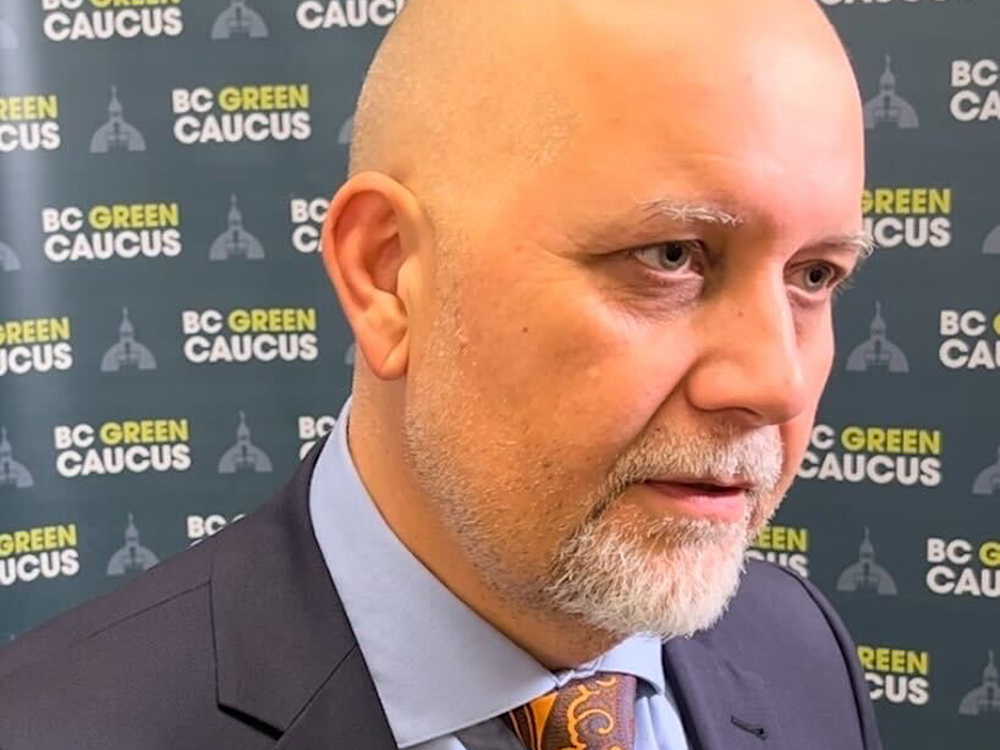BC Green Party MLA Adam Olsen is calling on B.C.’s minister of public safety to form a special policing unit dedicated to investigating the suspicious deaths and disappearances of First Nations people in the province.
Olsen, who is from the Tsartlip First Nation and represents Saanich North and the Islands, said he’d like to see B.C. investing as much in protecting First Nations people as it does in policing opposition to resource development — opposition that is frequently Indigenous-led and generally occurs in remote areas, such as the Wet’suwet’en opposition to the Coastal GasLink pipeline through northern B.C.
In 2017, the RCMP formed the Community-Industry Response Group, or C-IRG, to enforce protest-related injunctions granted to industry. Over the past six years, the force has spent more than $60 million on the unit, according to records obtained through access to information laws.
Most of that went to break up demonstrations against pipelines and old-growth logging. Under its policing agreement with the RCMP, B.C. is responsible for 70 per cent of that cost, roughly $42 million.
Olsen questioned Minister Mike Farnworth in the legislature on Nov. 28, describing a lack of action on cases of missing and murdered Indigenous people, as the province spends tens of millions to enforce injunctions granted to resource extraction companies.
“We’ve seen this minister of public safety’s response to protecting the premier's pipelines. He stood up a special unit called the Community-Industry Response Group,” Olsen said. “When will the minister of public safety spend as much lifting our people up as he is spending pushing them down?”
Over its first six years, until fiscal year-end on April 1, 2023, C-IRG cost taxpayers $61.5 million. Of that, about $1.7 million was spent to police protests in B.C. related to the “Freedom Convoy” in early 2022. The rest was spent on resource extraction conflicts — mainly Coastal GasLink, the Trans Mountain pipeline and the Fairy Creek old-growth logging protests on Vancouver Island.
More than half of C-IRG’s costs, $37 million, went to policing the Morice Forest Service Road, where Wet’suwet’en opposition to the Coastal GasLink pipeline led to several police actions over the past five years. Last year, the RCMP spent a record $11 million enforcing the pipeline company’s civil injunction.
C-IRG also spent over $19 million breaking up protests against old-growth logging on Vancouver Island, where more than 1,100 people have been arrested since 2021 in one of the largest acts of civil disobedience in Canadian history.
It remains to be seen how much is being spent on C-IRG during the current fiscal year, which ends March 31. But it appears demand for the unit may have slowed.
Coastal GasLink announced last month that its 670-kilometre gas pipeline had reached mechanical completion. Wet’suwet’en pipeline opponents say police patrols on the Morice and C-IRG presence in nearby communities have stopped.
In an email to The Tyee, RCMP Staff Sgt. Kris Clark said C-IRG deployed multiple times this year to both the Morice and Fairy Creek watershed for enforcement, but added that there were "few large-scale enforcement actions due to limited protester activities."
In Fairy Creek, RCMP made just three arrests this summer, according to news reports, shortly after Crown prosecutors withdrew charges against nearly 150 people.
In March, Canada’s police watchdog announced a systemic investigation into C-IRG after receiving hundreds of misconduct complaints. The Civilian Review and Complaints Commission, an independent body created to ensure fair and impartial investigations into complaints against the RCMP, said last month that it had experienced “significant delays” in obtaining the RCMP records it needs to complete its investigation.
A year ago, the province took steps to “standardize” C-IRG within the BC RCMP by dedicating $36 million over three years to the unit as part of an overall $230 million meant to bolster rural policing.
In an email, a spokesperson with B.C.’s Ministry of Public Safety and Solicitor General said the funding would provide C-IRG the “resources they need to manage unlawful protests effectively” while freeing up other police resources for public safety. The first full-time C-IRG officers were hired shortly after the funding announcement last November.
Responding to Olsen in the legislature last week, Farnworth said that future C-IRG spending will depend on “the amount of activity that they have to deal with.” He defended the province’s record in ensuring the safety of First Nations people.
“Police do investigate. We expect them to investigate cases of murdered and missing Indigenous women and girls,” Farnworth said. “To somehow suggest that we don’t care, or that we’re not interested, or they’re not doing anything, is just wrong.”
In a video later posted to social media, Olsen called the exchange “the most emotional” he’s ever been in the legislature.
“Because I’ve pled with him, just like communities have been pleading with him, to do something more than nothing,” he said. “We need a minister to be serious about this, and this minister has demonstrated that he’s serious about clearing Indigenous people out of the way of a pipeline and not serious about finding our missing and murdered Indigenous women and girls, Two-Spirited people, our young men that go missing.”
Both the National Inquiry into Missing and Murdered Indigenous Women and Girls and B.C.’s Missing Women Commission of Inquiry described police failures in adequately addressing the crisis.
A month ago, members of the Saik’uz First Nation, located near the Highway of Tears where dozens of Indigenous women and girls have gone missing or been found murdered in recent decades, put out a plea for information and an increased police response after two community members went missing within an eight-month period. Chelsey Heron Quaw’s remains were found days later near her home. Jay Raphael is still missing.
Speaking with The Tyee, Olsen used the example of Chelsea Poorman, a young Cree woman who went missing in Vancouver in 2020, as an example of police failure to adequately investigate the disappearances of Indigenous women. When Poorman’s remains were found 18 months later, police initially said her death was not suspicious, despite evidence of physical trauma.
Poorman was one of three young Indigenous women whose remains were found around the same time in 2022. All three cases raise questions about the quality of the police investigations, experts said at the time. Vancouver police have refused to release the RCMP’s external review of its Poorman investigation.
Olsen fears that an early determination of no foul play leads to apathy on the part of police investigators, who are unlikely to give a case adequate attention after publicly declaring it not suspicious.
“Once you say you don't think that there's anything wrong, you’re basically indicating the priority that that file is,” he said.
Olsen added that he would like to see the province invest as much in resolving cases of missing Indigenous people as it does in resolving resource extraction conflicts. He suggested teams including special investigators and prosecutors could be formed to improve the police response to suspicious deaths and disappearances in First Nations communities.
“The distinction clearly needs to be made that when it comes to suppressing and enforcing, that's easy, but when it comes to investigating and prioritizing, it’s not,” Olsen said.
Last week, the BC First Nations Justice Council testified at a Canadian Human Rights Tribunal inquiry into the RCMP’s investigation of historical abuses at schools in Burns Lake and Prince George. The council presented models for replacing RCMP abuse investigations with Indigenous-led investigation teams in First Nations communities, which could provide a more culturally appropriate policing alternative.
“They’re even able to appoint a gold commander for the C-IRG,” Olsen said about the gold-silver-bronze command structure within the specialized unit. “There’s no gold commander fighting the injustices of missing and murdered Indigenous women and girls.” ![]()
Read more: Indigenous, Rights + Justice, BC Politics

















Tyee Commenting Guidelines
Comments that violate guidelines risk being deleted, and violations may result in a temporary or permanent user ban. Maintain the spirit of good conversation to stay in the discussion and be patient with moderators. Comments are reviewed regularly but not in real time.
Do:
Do not: